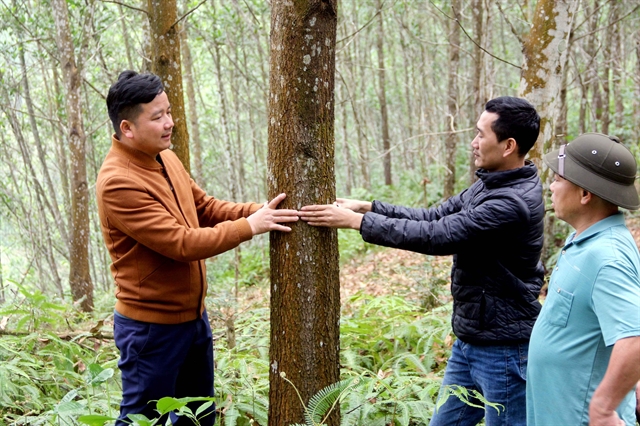 Economy
Economy

 |
| Employees of a timber company examine a tree in an FSC-certified forest in Tuyên Quang Province. Sustainable management of forests is one of the requirements at the heart of EVFTA. — VNA/VNS Photo Quang Cường |
HÀ NỘI — The EU-Việt Nam Free Trade Agreement (EVFTA) includes a chapter dedicated to sustainable development that covers not only environmental but also labour-related issues, said an official of the Ministry of Industry and Trade.
Ngô Chung Khanh who is Deputy Director General of the ministry's Multilateral Trade Policy Department said the issues of climate change, biodiversity, and the sustainable management of forest and living marine resources in bilateral trade had been brought to the fore since the formation of the agreement.
Vietnamese producers, under EVFTA, must now actively engage in the fight against illegal, unreported, and unregulated (IUU) fishing and fishing-related activities, and implement measures to exclude IUU-related products from the trade flows.
They are also required to promote trade in products derived from sustainably managed forests and combat illegal logging and trade-related activities that contribute to deforestation and forest degradation.
"EU regulations, such as the EU Deforestation Regulation, are intentionally aimed at European importers, who would take measures to ensure exporters along their supply chain be environmentally sustainable," said Khanh.
Nguyễn Hồng Loan, an expert of the CBAM's Technical Support Project on Impact Assessment, said over the past years the EU had raised the bar significantly on imports to lessen consumption's impact on the environment.
For instance, the EU brought the Carbon Border Adjustment Mechanism (CBAM) into force on 17 May 2023, which would impose tariffs on the carbon emitted during the production of carbon-intensive goods that are entering the market.
CBAM itself would come into application in its transitional phase on October 1, 2023, with the first reporting period for importers ending January 31, 2024. Once the system becomes permanent on January 1, 2026, importers will be required to declare each year the quantity of goods imported to the market and submit their corresponding number of CBAM certificates.
"The scope of products requiring CBAM certificates will enlarge between 2026 and 2034. We still have some time to prepare for the mechanism," said Loan.
Vương Đức Anh, Chief of Office of the Board of Directors of Vietnam National Textile and Garment Group, said the group had always kept itself up to speed about green regulations because textiles production is the industry with the third largest environmental impact in the EU.
He said the EU was working on Digital Product Passports for textiles in 2024, which aim to prevent greenwashing in the industry and ensure consumers are well-informed about the environmental footprint of their purchases. In fact, about three-fourths of green claims in the market have been found to be misleading.
He also said textiles would not be subject to CBAM tariffs for now because the mechanism would initially apply only to cement, iron and steel, aluminium, fertilisers, and electricity and hydrogen. Textile producers still have some time to prepare for the phase-in in the medium term.
"We buy organic cotton to make at least 20 per cent of our fibres recyclable and environmentally friendly," said Anh.
Nguyễn Thị Thu Trang, director of the WTO and Integration Centre, Vietnam Chamber of Commerce and Industry (VCCI), said a VCCI survey in August showed that Vietnamese producers had become more environmentally conscious.
Nearly 70 per cent of the respondents said they were fully aware of the EU Farm-to-Fork Strategy, which aims to make food systems healthier and environmentally friendly, and 80 per cent were somewhat aware of the EU Deforestation Regulation.
"The market for green products is promising because it is new and less competitive than that for non-green ones," said Trang. — VNS




